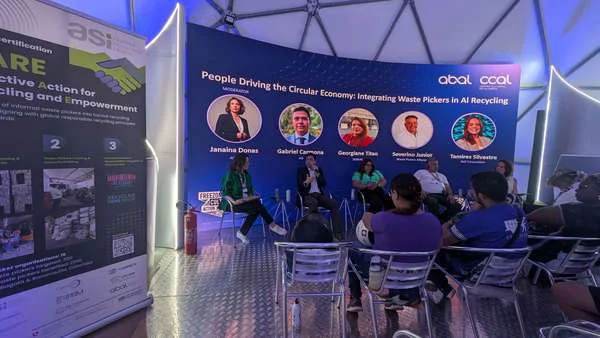Waste Pickers, Circularity and Aluminium: ASI’s Insights from COP30
ASI’s participation at COP30 highlighted the importance of inclusive circularity, with Gabriel Carmona Aparicio, Circularity Research Manager, presenting the CARE project during the panel “People Driving the Circular Economy: Integrating Waste Pickers into Aluminium Recycling”, hosted by IAI, ABAL and ASI.
25 November 2025
COP30 offered a useful opportunity to understand how aluminium is being positioned within global climate and circular economy discussions. Much of the sector’s visibility came through satellite events, with ABAL’s Aluminium Dome proving particularly effective, receiving more than 40,000 visitors over 13 days, according to ABAL. By being open to the public, it attracted a broad and diverse audience, in contrast to the COP Blue Zone – the UN-managed, accreditation-only area where official events took place.
 For ASI, the main highlight was the panel “People Driving the Circular Economy: Integrating Waste Pickers into Aluminium Recycling”, where Gabriel Carmona Aparicio, ASI’s Circularity Research Manager, participated. The session provided an important platform to present progress from the Collective Action for Recycling and Empowerment (CARE) project and to demonstrate how standards, data systems and multi-stakeholder frameworks can help support more responsible and inclusive recycling systems. The discussion echoed a central message of COP30: millions of waste pickers sustain global recycling rates, yet remain largely invisible in climate and financing frameworks. It also helped position aluminium more firmly within wider discussions around a just transition, highlighting that integrating waste pickers into formal markets is both a matter of social justice and environmental effectiveness.
For ASI, the main highlight was the panel “People Driving the Circular Economy: Integrating Waste Pickers into Aluminium Recycling”, where Gabriel Carmona Aparicio, ASI’s Circularity Research Manager, participated. The session provided an important platform to present progress from the Collective Action for Recycling and Empowerment (CARE) project and to demonstrate how standards, data systems and multi-stakeholder frameworks can help support more responsible and inclusive recycling systems. The discussion echoed a central message of COP30: millions of waste pickers sustain global recycling rates, yet remain largely invisible in climate and financing frameworks. It also helped position aluminium more firmly within wider discussions around a just transition, highlighting that integrating waste pickers into formal markets is both a matter of social justice and environmental effectiveness.
Engagement with the International Alliance of Waste Pickers was another significant outcome. Representatives from India, Nigeria, South Africa, Brazil and Chile joined the discussion and expressed strong appreciation for the aluminium sector’s willingness to engage with these topics. They noted that aluminium’s growing collaborative engagement adds an important dimension to discussions historically centred on plastics. They also highlighted that aluminium’s high value and high recovery potential create a unique opportunity for collaboration, and encouraged ASI and partners to extend the CARE approach to more regions.
Hosting COP30 in the Amazon brought renewed attention to the role of resource-producing regions and showed how discussions on aluminium must increasingly connect climate goals with the realities of the areas where the sector operates. The conversations throughout the week showed how efforts on circularity and decarbonisation need to be tied to what matters locally: community livelihoods, healthy ecosystems and sustainable regional development. Across aluminium-focused events at COP30, common themes emerged: the need to shift from ambition to practical implementation, the importance of improved data and traceability, and the value of stronger collaboration across the value chain.
Together, these discussions reinforced the central message from COP30: advancing circularity requires inclusive approaches, practical support, and sustained partnerships across the recycling system.
SHARE THIS ARTICLE


